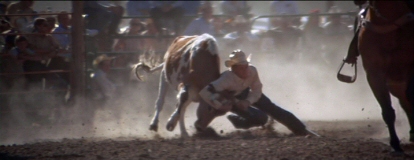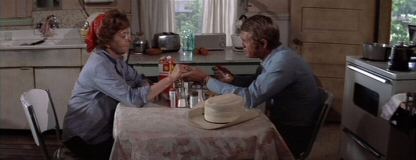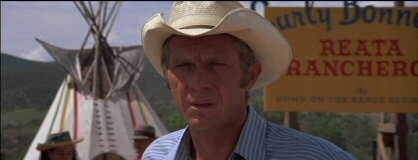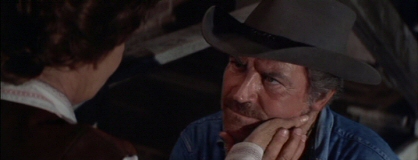Junior Bonner (Sam Peckinpah, 1972)
 Owing a great deal to Nicholas Ray’s
iconic portrait of tough-guy mores, The Lusty Men, Sam Peckinpah’s Junior
Bonner is a superior rodeo movie. It presents an intricately layered
worldview that ultimately supercedes its rather conventional narrative.
Concerned, like many of Peckinpah’s films, with aging and obsolescence to the
extent that it turns the convictions of its titular hero (Steve McQueen) into a
romantic quest of sorts, the picture’s true meaning lies in the grace notes
and minor details that Peckinpah injects throughout. Superbly edited, with
thoroughly unconventional cutting and few establishing shots, Peckinpah’s work
highlights small, intimate details that most other films of this sort would
gloss over. As a result, it becomes less about Junior’s quest for an
eight-second ride atop a bucking bronco than it is about Junior’s place in his
world.
Owing a great deal to Nicholas Ray’s
iconic portrait of tough-guy mores, The Lusty Men, Sam Peckinpah’s Junior
Bonner is a superior rodeo movie. It presents an intricately layered
worldview that ultimately supercedes its rather conventional narrative.
Concerned, like many of Peckinpah’s films, with aging and obsolescence to the
extent that it turns the convictions of its titular hero (Steve McQueen) into a
romantic quest of sorts, the picture’s true meaning lies in the grace notes
and minor details that Peckinpah injects throughout. Superbly edited, with
thoroughly unconventional cutting and few establishing shots, Peckinpah’s work
highlights small, intimate details that most other films of this sort would
gloss over. As a result, it becomes less about Junior’s quest for an
eight-second ride atop a bucking bronco than it is about Junior’s place in his
world.
 The director uses rodeo as
characterization as expressively as other films have used dance or martial arts
battles. One particularly great sequence shows the transient nature of
Junior’s success by following a single, spectacular, slow-motion shot of his
achievement of the top time in a round of competition with the six seconds, shot
in real time, in which he quickly loses the lead. Junior takes the loss in
stride, though, driving home the (possibly outmoded) notion that his work
provides its own satisfaction. This scene is followed by an equally brilliant
one in which Junior and his aging father (Robert Preston) bond while
participating in a cow-milking competition. At the same time, Junior’s
semi-estranged mother (Ida Lupino) watches from the stand, relaying a complex
string of judgments and reactions toward the men in her life, without any
dialog. Even Nicholas Ray rarely had his characters express themselves through
their actions to this extent, but Peckinpah’s meanings never feel vague. Junior
Bonner is so filled with such small details that every scene becomes a new
opportunity to make clear both the code of honor that exists between these men
and the modern threats to their lifestyle.
The director uses rodeo as
characterization as expressively as other films have used dance or martial arts
battles. One particularly great sequence shows the transient nature of
Junior’s success by following a single, spectacular, slow-motion shot of his
achievement of the top time in a round of competition with the six seconds, shot
in real time, in which he quickly loses the lead. Junior takes the loss in
stride, though, driving home the (possibly outmoded) notion that his work
provides its own satisfaction. This scene is followed by an equally brilliant
one in which Junior and his aging father (Robert Preston) bond while
participating in a cow-milking competition. At the same time, Junior’s
semi-estranged mother (Ida Lupino) watches from the stand, relaying a complex
string of judgments and reactions toward the men in her life, without any
dialog. Even Nicholas Ray rarely had his characters express themselves through
their actions to this extent, but Peckinpah’s meanings never feel vague. Junior
Bonner is so filled with such small details that every scene becomes a new
opportunity to make clear both the code of honor that exists between these men
and the modern threats to their lifestyle.
 Although Junior Bonner is
unsubtle in its thematic intentions (for example, the scene where Junior watches
as the destruction of his father’s ranch is about as schematic as such a scene
could be), its achievement of those goals is surprisingly deft and undeniably
heartfelt. Junior emerges a man of certainty and rock-steady belief in a world
that should fill him with doubt. By comparing Junior to his brother Curly, in a
light that’s not entirely favorable, or by including his father, who is too
old to be chasing the dreams he still holds onto, Peckinpah allows us to feel
some of that doubt ourselves. Nonetheless, Junior is a man committed to his
vocation, despite a world that seems unconvinced about his, or his sport’s
longevity (he’s offered three alternative jobs during the course of the film),
and that commitment clearly earns him Peckinpah’s respect. When Junior finally
does succeed professionally once more, the lack of histrionics (the only hug he
receives comes from a clown) demonstrates the film’s commitment to his
workingman’s pride.
Although Junior Bonner is
unsubtle in its thematic intentions (for example, the scene where Junior watches
as the destruction of his father’s ranch is about as schematic as such a scene
could be), its achievement of those goals is surprisingly deft and undeniably
heartfelt. Junior emerges a man of certainty and rock-steady belief in a world
that should fill him with doubt. By comparing Junior to his brother Curly, in a
light that’s not entirely favorable, or by including his father, who is too
old to be chasing the dreams he still holds onto, Peckinpah allows us to feel
some of that doubt ourselves. Nonetheless, Junior is a man committed to his
vocation, despite a world that seems unconvinced about his, or his sport’s
longevity (he’s offered three alternative jobs during the course of the film),
and that commitment clearly earns him Peckinpah’s respect. When Junior finally
does succeed professionally once more, the lack of histrionics (the only hug he
receives comes from a clown) demonstrates the film’s commitment to his
workingman’s pride.
 McQueen’s performance is verbally
inexpressive, but is physically articulate, giving us strong insight into his
character’s interior life. His characterization is chock full of terrific
nuance, but very little dialogue. In a scene that shows him nervously awaiting
the results of a lottery to determine the bull he will ride, we don’t get a
reaction shot of the actor, but instead a extreme close-up of him nervously,
almost unconsciously, fiddling with a typewriter. That’s a refined and
unexpected touch typical of Junior Bonner, though. Even the treatment of
Junior’s nominal, seemingly obligatory, love interest, expressed throughout
most of the film entirely in visual terms, turns out to be something of a
non-starter, serving more as a springboard for which Peckinpah can transfer the
erotic energy that existed between Junior and his groupie to Junior’s parents,
in a subtly tragic, but immeasurably moving scene that closes their character
arc.
McQueen’s performance is verbally
inexpressive, but is physically articulate, giving us strong insight into his
character’s interior life. His characterization is chock full of terrific
nuance, but very little dialogue. In a scene that shows him nervously awaiting
the results of a lottery to determine the bull he will ride, we don’t get a
reaction shot of the actor, but instead a extreme close-up of him nervously,
almost unconsciously, fiddling with a typewriter. That’s a refined and
unexpected touch typical of Junior Bonner, though. Even the treatment of
Junior’s nominal, seemingly obligatory, love interest, expressed throughout
most of the film entirely in visual terms, turns out to be something of a
non-starter, serving more as a springboard for which Peckinpah can transfer the
erotic energy that existed between Junior and his groupie to Junior’s parents,
in a subtly tragic, but immeasurably moving scene that closes their character
arc.
72
Jeremy Heilman
01-03-05